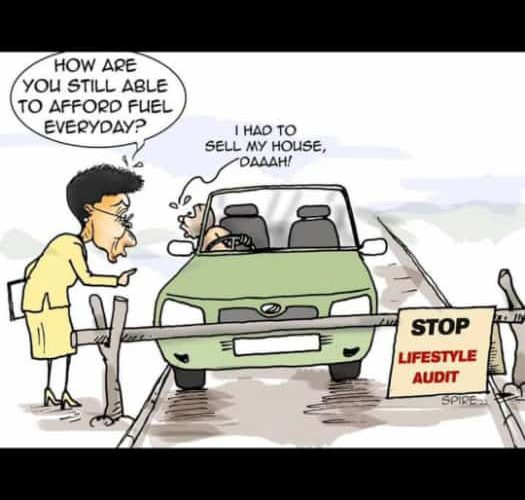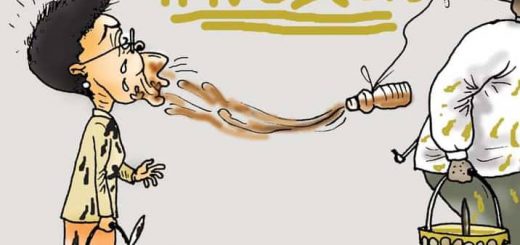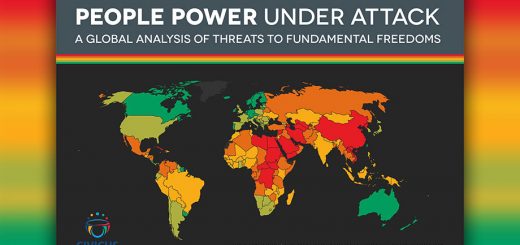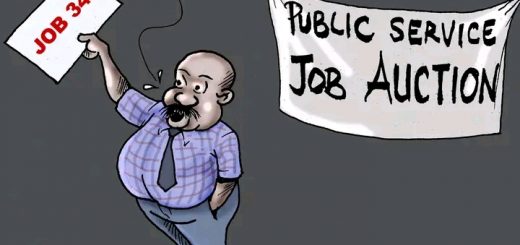Asset recovery in Uganda. The uphill battle to recover proceeds of corruption in Uganda.

Corruption in Uganda leads to the plunder of more than ten trillion shillings every year in stolen public resources, bribes paid to access Public services and in wasted expenditure. Therefore, corruption consumes more than a quarter of the national budget of Uganda. When you factor in corruption in the civil Society organizations and corruption in the private sector, corruption in Uganda could account for more than half of the national budget of Uganda. The problem of corruption in Uganda is so insurmountable because of the institutionalization of corruption. In Uganda a person who does not engage in corruption is rediculed and openly mocked whereas the crooks and thieves are openly glorified and praised as being cunning and hardworking. The public in Uganda is apathetic to the prevalence of corruption in the community though it suffers under the heavyweight of poor service delivery, high national debt and collapsing public infrastructure. The biggest challenge is that most Ugandans are tribalistic, poor, illiterate and hopeless. They have lived under an oppressive and corrupt regime for too long and see no hope for the future. Ugandans are just content to put food on the table and enjoy a little peace and quiet. Ugandans have given up on proper accountability, economic growth and good service delivery because they have lost hope in ever attaining them. They are just glad that there is peace and quiet in the country.
Given the grand corruption and plunder of public resources, it is imperative that anti corruption agencies trace and recover Illicitly acquired wealth so as to make inroads against corruption. In most cases a corrupt person will plunder billions of shillings meant for public service delivery and live like a king without consequences because of the lack of the political will to combat corruption in Uganda. Those that have sufficient connections to the chief executive in Uganda do not have to worry about criminal sanctions or asset confiscation because anti corruption agencies operate under the control and whim of the chief executive. Those that lack the connections to prevent criminal sanctions will either not be investigated by the anti corruption agencies due to inefficiency and lack of sufficient resources and manpower. Those thieves and crooks who are unlucky enough to be investigated and successfully prosecuted are given lenient sentences and their ill-gotten wealth is never successfully confiscated from them. Therefore, they serve their short prison sentences while their children and relatives live the good life and enjoy the ill-gotten wealth. Even the prison life of the rich and wealthy is clean, comfortable and happy and after a few short years it’s back to business as usual. To deter corruption, those that engage in corruption must be severely punished with deterrent sentences such as the death penalty, consecutive sentences and strict asset recovery or confiscation.
Successfull asset recovery so as to confiscate proceeds of crime requires accurate and reliable information relating to the activities, wealth, affiliations, assets and property of those engaged in corruption. In a none cash economy, information relating to transactions entered by individuals is easy to collect and access but the task is an uphill one in an cash economy plagued with wide spread corruption. In such a cash economy, the criminals and the innocent alike are always transacting with no easily accessible record of their transactions. In many jurisdictions where corruption is prevalent, proceeds of crime are laundered through both registered and unregistered properties, businesses registered to third parties, crypto-currencies and similar assets. A good asset recovery legal framework must use a combination of strong anti Money laundering regulations, deterrent punishments for violators and strong registration requirements that reduce the prevalence of untraceable nominees. In Uganda asset recovery is difficult because:
- High prevalence of unregistered properties and equitable interests. In Uganda there is no general requirement that property should be registered in the names of the legal owner and a requirement to register all beneficial owners of the property. To improve transparency and aid asset recovery the state should impose a legal requirement that property must be registered to the owner of the beneficial estate within three months of the acquistion of the beneficial ownership. A person who doesn’t declare their beneficial ownership should not be able to enforce his or her beneficial interest in the property.
- The existence of a large cash economy that eclipses the none cash economy. In Uganda most people transact in cash and more than two quarters of the citizens do not have a bank account. The situation has improved slightly due to the proliferation of mobile money services but still a third of the population has no access to both mobile money services and a bank account. The state needs to ensure that certain transactions especially relating to land and acquisition of other assets such as cars and machinery are carried out through mobile money or a bank account. A legal requirement should be imposed requiring all transactions relating to land to be registered and requiring the funds involved to be paid using a bank account. This will reduce the practice of laundering money through the acquisition and development of real property in Uganda. A requirement to register certain transactions exceeding a specified value should also be required so as to prevent money laundering. Another step that the country can take is to introduce state sponsored low interest credit or debit cards that will encourage individuals to pay for goods and services electronically rather than using cash.
- The legal framework in place to facilitate asset recovery and confiscation is full of loopholes. For example the IG which is the main anti corruption agency in Uganda has no legal personality. This prevents it from suing on behalf of the state and from enforcing state obligations. The lack of legal personality also prevents the Inspectorate of Government from engaging in none conviction based asset recovery because it can not sue on behalf of the state. Furthermore, the law on none conviction based asset recovery is not clear enough and it is not wide enough to allow for easy confiscation of Illicitly acquired wealth without first obtaining a criminal conviction. The state need to reform the legal framework on asset recovery and empower anti corruption agencies to easily confiscate Illicitly acquired wealth without the need for a conviction subject to such safeguards as are necessary to protect the right to property.
Uganda will not be able to deter corruption and recover Illicitly acquired wealth unless the legal framework in place is overhauled to address unregistered properties and put in place deterrent sentences for those that engage in Corruption. The only alternative to asset recovery given that the plunder of public resources has been going on for more than three decades is the imposition of a corruption adjustment tax. Uganda will for ever remain the banana republic of Uganda until it improves service delivery through effectively combating corruption and recovering plundered public resources.
Read More Stories
- Ideal Amendments that should be included in the Magistrates Courts Amendment Bill 2026 of Uganda
- President Yoweri Kaguta Tibihaburwa Museveni is a minority President voted by only 7,946,772 (36.7%) out of 21,649,608 eligible Ugandan voters in the 2026 Presidential Elections
- Four years of IGG Beti Kamya drowned the Inspectorate of Government (IG) deeper into oblivion and irrelevancy but it Can be redeemed
- The Proposal to Make Magistrates Grade Ones Chief Magistrates is an efficient use of resources that will improve service delivery in Uganda
- If Magistrates Courts in Uganda are less competent and more prone to corruption does it mean that the poor deserve inferior justice to the rich.


